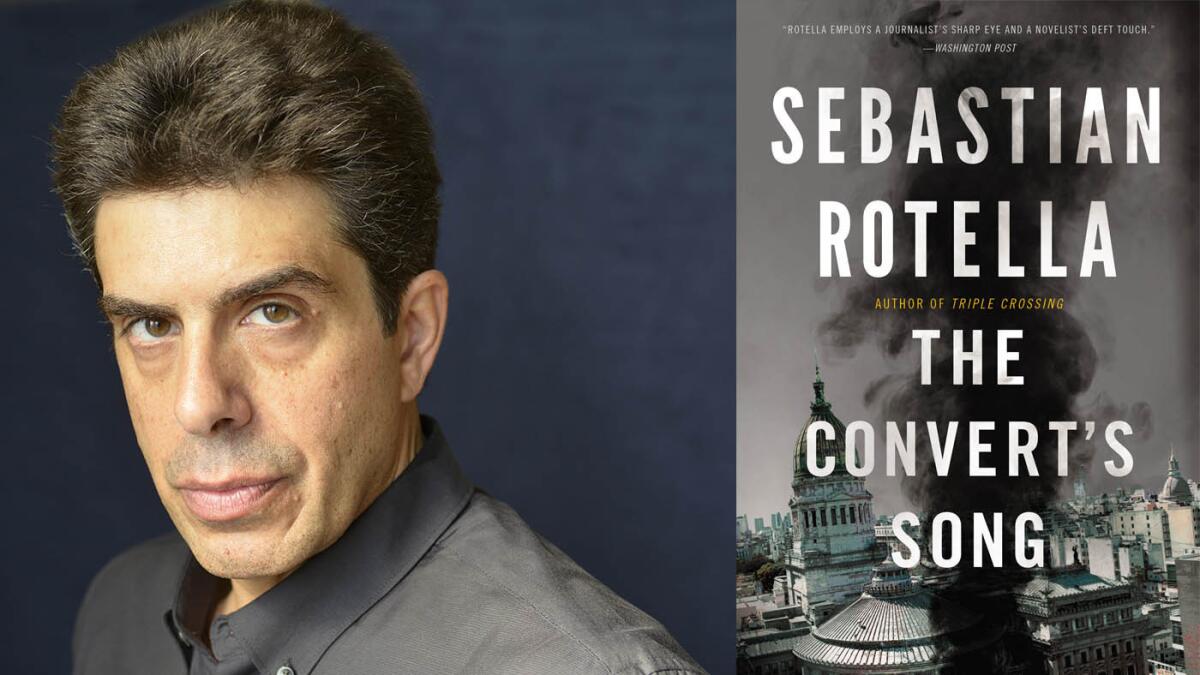Review: ‘The Convert’s Song’ is a skillfully layered thriller

At the center of “The Convert’s Song” — Sebastian Rotella’s riveting follow-up to his 2011 debut novel, “Triple Crossing” — are two childhood friends thrown together after 10 years of mutual silence, when their paths in life have clearly diverged. It’s an affecting drama of human ties, raising big themes of loyalty, obligation, loss and love. It’s also a thriller about a global manhunt and an international ring of Islamic terrorists. There’s plenty of action, all of it fast-paced and gripping, but it’s the relationship between the men that drives the story, giving it depth and urgency.
Three years after the events of “Triple Crossing,” Valentine Pescatore is living in Buenos Aires, working as a private investigator in an agency serving the tri-border area (Argentina, Paraguay and Brazil), with mostly company and government clients. He’s left the United States after the dissolution of his engagement, and he has few friends in Argentina other than his boss, a Jewish Argentine with connections in embassies, law enforcement and intelligence agencies.
Even so, he’s starting to feel comfortable in Buenos Aires when he runs into old pal Raymond Mercer. The next week, a terrorist attack kills hundreds at a shopping center in a Jewish neighborhood, and the investigation zeros in on Mercer. Naturally, Mercer has vanished, but not before trying to contact Pescatore and thereby implicating him in the attacks.
Mercer is a friend fatale in the tradition of Harry Lime and Terry Lennox, a troublemaker who embroils our hero in his schemes through bonds that cannot be ignored. (This tradition is signposted by references to “Angels With Dirty Faces” and “The Long Goodbye” — the latter shortly after Pescatore takes a beating from police thanks to his connection to Mercer.)
Mercer was Pescatore’s best friend in Chicago — where the boys grew up talking music and watching gangster movies — a charismatic playboy with a golden singing voice and an itch for criminal adventure. The two cut ties after Pescatore declined involvement in an illegal caper of Mercer’s design. “No matter how slick you are ... it’s a game,” Pescatore told him on the night of their rupture. “And you’re dragging me down with you.”
Now, finding the enigmatic Mercer and uncovering his beliefs and desires may be the key to preventing another devastating attack. Pescatore chases him “across land and sea through terror and bloodshed,” but Mercer is slippery. He isn’t just hard to find — Pescatore has trouble pinning his old friend down even in the abstract. His image of Mercer shifts with every revelation — he could be a criminal or an informant, a terrorist, gangster or spy; a true believer or a racketeer; maybe all of the above.
Pescatore teams with Fatima Belhaj, a Moroccan French police commissaire, who is, as we learn through a relentless attention to her “generous chest, hips and behind,” sexy. Their romance is thin and unconvincing. It’s the only big flaw in the book, but it’s easy (maybe too easy?) to ignore, because most of their time together involves their action-packed search for Mercer. They interview his mistress in Buenos Aires, his wife in Paris, a woman in Bolivia he called the queen of the jungle; they talk to his French ex-handler, a boat jouster known as the Commandant.
The plot becomes dense and complicated, following a network of terror that sprawls across ethnic and national lines. Rotella explores the strains of terrorist motivations — religion, nationalism, anti-imperialism, greed — and the overlap of terrorism and common criminality, “the drug trade as a covert jihad.”
His background as a journalist proves useful in his fiction (currently a senior reporter at ProPublica, he worked at the L.A. Times for 23 years). He handles complex subjects with confidence and seeming ease, rendering them clear and exciting for his presumably less knowledgeable readers. His prose is vivid and precise, his sense of setting sharply illuminating. Buenos Aires in particular comes roaring to life, a city that marks “the border between illusions of Europe and the reality of Latin America,” where “[p]eople are sophisticated, educated … [b]ut they’ll rob you at noon in front of City Hall.”
He’s also a thoughtful writer, treating the loaded topic of Islamic terrorism with commendable subtlety. “The rich and powerful nations decide who the terrorists are, who the war criminals are, who can plant bombs and commit assassinations,” notes Mercer’s cousin, a Lebanese Argentine non-practicing Catholic. And of course, once in a little while, the righteous West behaves badly.
None of this careful writing and moral nuance takes away from the sweeping excitement of the international intrigue — “The Convert’s Song” is just that rare thing, a rousing thriller with a fine weave. But while the adrenaline induces the page-turning, it’s the characters that make the book memorable. Mercer and Pescatore provide both heart and heartbreak, the music that brings this powerful novel to life.
Cha is the author of “Beware Beware.”
The Convert’s Song
A novel
Sebastian Rotella
Mulholland: 336 pp., $26
More to Read
Sign up for our Book Club newsletter
Get the latest news, events and more from the Los Angeles Times Book Club, and help us get L.A. reading and talking.
You may occasionally receive promotional content from the Los Angeles Times.








